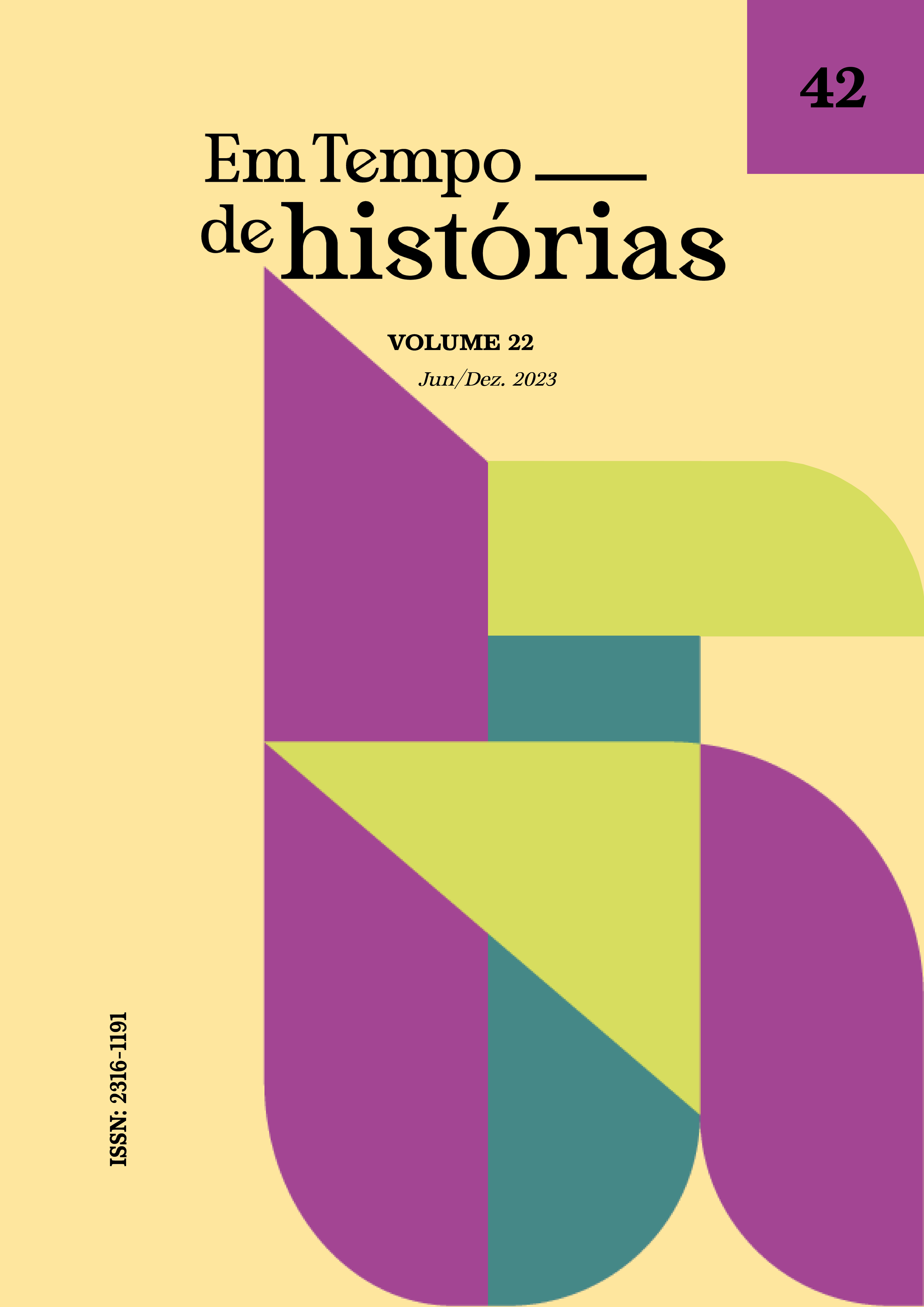The revolutionary legions of Paraná and the lieutenant opposition to the intervenor Mário Tourinho
DOI:
https://doi.org/10.26512/emtempos.v22i42.50362Keywords:
Vargas Government, Intervention, Revolutionary tenentismAbstract
The revolutionary legions had their beginnings in October 1930, and since then political dissent in relation to situationism began. The “tenentista” political organization emerged from the action of the military that acted in the armed movement of 1930 in the state, also bringing together civilian supporters of the “tenentista” movement of the 1920s and the Liberal Alliance. In Paraná, the opposition to the “interventor” Mário Tourinho began to be organized in December 1930. The military elements linked to the legions and revolutionary “tenentistas” clubs revolted with the political practices of the “interventoria”. These agents sent a series of telegrams to the office of Oswaldo Aranha, one of the main articulators of the Vargas government with the “interventorias”, with great negotiation power between the revolutionary lieutenants and the dissident oligarchs. This crisis ended with the dismissal of Mário Tourinho from the federal interventorship, in December 1931. This work intends to investigate the lieutenants' opposition to the “interventor” based on the sources of the Oswaldo Aranha Archive, available in the CPDOC-FGV collection. Through the correspondences sent to the ministerial cabinet, we will analyze the actions of opposition to the “interventor” made by the revolutionary legions, relating these facts with the style of political centralization practiced by the Provisional Government of Getúlio Vargas.
Downloads
References
Arquivo Oswaldo Aranha, FGV CPDOC, OAcp1930.12.4. Correspondência a Oswaldo Aranha, sobre a situação política do estado do Paraná, e sobre perseguições políticas e necessidade de reconstrução do estado. São Paulo, 1930.
Arquivo Oswaldo Aranha. FGV CPDOC, OAcp1931.07.22. Telegrama de Manuel da Nóbrega a Oswaldo Aranha informando acerca das hostilidades promovidas por Mário Tourinho contra partidários da Legião Paranaense, e solicitando sua transferência da Guarnição do
Paraná. Curitiba, 1931.
Arquivo Oswaldo Aranha, FGV CPDOC OA cp 1931.04.08/1. Telegrama de Mário Alves Monteiro Tourinho a Oswaldo Aranha sobre remessa de processos, com o envolvimento do ex-presidente do estado, Munhoz da Rocha. Curitiba, 1931.
Arquivo Oswaldo Aranha, FGV CPDOC, OA cp 1931.05.07/1 . Carta de Stoll Nogueira a Oswaldo Aranha sobre a situação política no Paraná, e sobre o enfraquecimento do Diretório Revolucionário, propiciado na ocasião para a instalação oficial da Legião de Outubro. Curitiba, 1931.
CONNIFF, Michael. Os tenentes no poder: uma nova perspectiva da Revolução de 30. In: FIGUEIREDO, Eurico de Lima (coord.). Os militares e a Revolução de 30. Rio de Janeiro: Paz e Terra, 1979.
DRUMMOND, José Augusto. O movimento tenentista: a intervenção política dos oficiais jovens (1922-1935). Rio de Janeiro: Graal, 1986.
FLYNN, Peter. A Legião Revolucionária e a Revolução de 30. In: FIGUEIREDO, Eurico de Lima (coord.). Os militares e a Revolução de 30. Rio de Janeiro: Paz e Terra, 1979.
FORJAZ, Maria Cecília Spina. Tenentismo e Revolução de 30. In: UFRGS (org.). Simpósio sobre a Revolução de 30. Porto Alegre: Erus, 1983.
LYNCH, Christian Edward Cyril. Da monarquia à oligarquia: história institucional e pensamento político brasileiro (1822-1930). São Paulo: Alameda, 2014.
NEGRÃO, Francisco. Genealogia Paranaense. Volume 2º. Curitiba: Impressora Paranaense, 1927.
NEGRÃO, Francisco. Genealogia Paranaense. Volume 5º. Curitiba: Impressora Paranaense, 1946.
O DIA. O primeiro grito de oposição. 17.mar.1931, p.2.
O DIA. Tranquilize-se o Paraná: liberto pelas suas próprias mãos, continuará a ser governado pelos seus próprios filhos. 04.mar.1931, p.1.
O DIA. O novo chefe de polícia. 05.mar.1931, p.1.
O DIA. O Major Plínio Tourinho deixou a chefia do Estado Maior da Região. 13.mar.1931, p.2.
O DIA. O Chefe da Nação...reafirma o seu absoluto apoio e integral confiança ao interventor. 20.mar.1931, p.1.
SILVA, Hélio. 1931: Os tenentes no poder (O ciclo de Vargas- volume IV). Rio de Janeiro: Civilização Brasileira, 1972.
SOUZA, Maria do Carmo Campello de. Estado e Partidos Políticos no Brasil (1930 a 1964). São Paulo: Alfa-Ômega, 1976.
WIRTH, John D. O Tenentismo na Revolução de 30. In: FIGUEIREDO, Eurico de Lima (org.). Os militares e a Revolução de 1930. Rio de Janeiro: Paz e Terra, 1979.
Downloads
Published
How to Cite
Issue
Section
License
Copyright (c) 2023 Em Tempo de Histórias

This work is licensed under a Creative Commons Attribution-NonCommercial 4.0 International License.
Autores que publicam nesta revista concordam com os seguintes termos:
- Autores mantém os direitos autorais e concedem à revista o direito de primeira publicação, sendo o trabalho simultaneamente licenciado sob a Creative Commons Attribution License , licença que permite que outros remixem, adaptem e criem a partir do seu trabalho para fins não comerciais, e embora os novos trabalhos tenham de lhe atribuir o devido crédito e não possam ser usados para fins comerciais, os usuários não têm de licenciar esses trabalhos derivados sob os mesmos termos.
- Autores têm autorização para assumir contratos adicionais separadamente, para distribuição não-exclusiva da versão do trabalho publicada nesta revista (ex.: publicar em repositório institucional ou como capítulo de livro), com reconhecimento de autoria e publicação inicial nesta revista.
- Autores têm permissão e são estimulados a publicar e distribuir seu trabalho online (ex.: em repositórios institucionais ou na sua página pessoal) a qualquer ponto antes ou durante o processo editorial, já que isso pode gerar alterações produtivas, bem como aumentar o impacto e a citação do trabalho publicado (Veja O Efeito do Acesso Livre).













